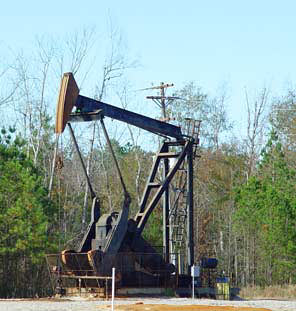Revisiting the Past: Black Gold
 My hometown has a web site, and here's downtown Heidelberg. I see the building that housed my parents' grocery store for some fifteen years.
My hometown has a web site, and here's downtown Heidelberg. I see the building that housed my parents' grocery store for some fifteen years.Since World War II, my hometown's economy has been largely dependent upon the oil and gas industry. According to this Department of Energy publication, the East Heidelberg Field was one the top 100 producing oil fields in the United States in 2000.
Oil production and exploration meant good times for the people of my hometown. Increased gasoline prices meant further exploration in the United States, and of course, Mississippi. Oil exploration in Mississippi crashed in the mid-1980s, but has improved some in the past year what with prices heading upward again.
There was an article in the New York Times last year concerning this renewed exploration and emphasizing another town where I formerly lived, Laurel. Here's an excerpt:
In what was once the capital of the Mississippi petroleum business, the new oil boom is hidden in plain sight.
There is a drilling platform behind the Shoney's 24-hour restaurant. Just blocks from City Hall, a rig natters loudly, tended by four roughnecks. Across the road from the country club, nearly a dozen tall blue pumps nod like a council of sleepy elders.
The high price of oil, hovering around $70 a barrel, has brought a nearly dormant Mississippi petroleum industry roaring to life. Wells abandoned long ago by the major oil companies are being reopened by independent operators. Requests for new drilling permits have spiked. Trainees for oil-field work can make nearly $14 an hour. Companies wait 12 months to rent the kind of field equipment that was once sold for scrap.
Five years ago there were some 20 functioning oil wells inside the city limits of Laurel; now there are 83.
But many people here have barely noticed, perhaps because they have lived for decades amid the industrial furniture of the oil patch. Or perhaps because, unlike the boom of the 1970's and 80's, this one has not brought private jets, $1,200 bar tabs, high-stakes craps games or trips out to the Capri Club, an establishment of ill repute where oilmen had corporate accounts. Oil is back, but without the old trappings.1
There's more to this article, including an interview with a person who was a high school classmate of my father.
When I was in graduate school at Mississippi State University, I wondered what was going to be the topic of my master's thesis. Then I ran across this article, and I knew.
 If you're interested in a good book concerning oil exploration in Mississippi in the 1980s, I recommend Oil Notes by Rick Bass. It's an outstanding book, and I like to reread every two years or so now.
If you're interested in a good book concerning oil exploration in Mississippi in the 1980s, I recommend Oil Notes by Rick Bass. It's an outstanding book, and I like to reread every two years or so now._______
1Shaila Dewan. "As Oil Rises in Markets, Rigs Rise in Mississippi." New York Times, June 17, 2006.
0 Comments:
Post a Comment
<< Home